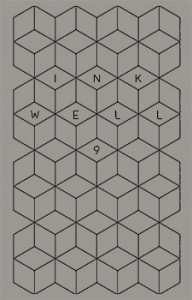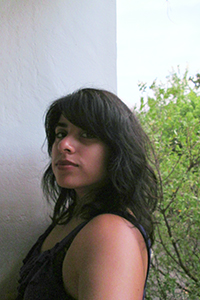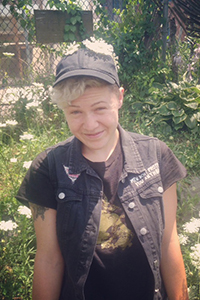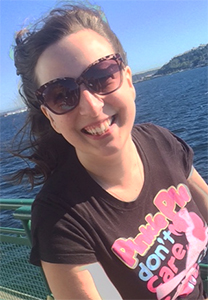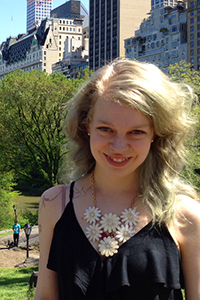[Writing for Inkwell gave me] a sense that my words and my story matter to someone beyond myself. I think it also helped me to help others in their writing—to ask more questions that could lead to greater levels of inquiry into self, into language.
– Roxana Bell, Inkwell 9 author
The newest edition of Inkwell: A Student Guide to Writing at Evergreen is done!
In this article, Writing Center Publications Editor Thane Fay met with four of this year’s Inkwell authors to talk about their experiences writing for the publication, what they hope the Evergreen community will take from their pieces, and their goals now as alumni.
You can pick up a free copy of Inkwell 9 at the Writing Center, read the digital version online, or come to InkFest: Wednesday October 15th, from 1-3 p.m. in the Olympia campus library lobby!
Roxana Bell, author of The Practice of Writing Grief • Graduated June 2014
What do you hope the Evergreen community will learn from your work in Inkwell?
RB: In my piece, I wrote about identity and the most painful facet of my own identity. Therefore, I’d hope that the Evergreen community could take away something I’ve learned, which is [that] identity is a constant shifting entity that refuses to be pinned down in one neat package. Additionally, I’d hope my piece could help others to see that that aspect of self that we tend to silence is where our power (and probably our broken heart) lives. And maybe in breaking the silence one can take a step towards healing and self-knowledge.
Next, my piece directly tackles my experiences as an adoptee. So, I’d love to have the Evergreen community and the broader community that is not directly within the adoption community start to question, examine, and analyze adoption practices domestically and internationally, our domestic foster care system, and the makings of familial units. This topic also asks larger questions around blood ties, cultural heritage, race, and power, privilege, and oppression on a global scale. As you can see there are many layers to be unearthed!
What have you gained from participating in the Inkwell process?
RB: I gained was a sense that my words and my story matter to someone beyond myself. I think it also helped me to help others in their writing—to ask more questions that could lead to greater levels of inquiry into self, into language.
What are your goals now as an alumna?
RB: This is a very scary question. I think I want to continue the threads of study that I began at Evergreen. Much of my work at Evergreen centered around American history, post-colonial literature, trauma studies, and cultural identity. In the long term, I’d like to go to graduate school. I have a strong feeling that whatever I decide to do in graduate school that it will be deeply influenced by my time as a student at Evergreen. To end, my future is wide open and I can only hope that the learning I did both inside and outside the classroom will guide me as I move forward in the world.
Rachel Cermak, author of Writing the Future: History As a Transformative Practice • Graduated June 2014
What have you gained from participating in the Inkwell process?
The Inkwell process … was exactly the push I needed in my writing. The many sessions I had with the editorial board forced me to closely examine my ideas, how my academic privilege manifests in my writing, the accessibility of my work, the structure of my piece, all the way down to my syntax, grammar, and punctuation.
The editorial board … made the editing process a safe place for me to share my doubts, frustrations, mistakes, excitement, and joy about the piece. I think that I gained the most from those sessions—they made me wish that there were more spaces outside the editing process and outside the Writing Center where people intentionally get together to talk about and refine their ideas, with mutual safety and growth being prioritized.
What about the Inkwell process will you apply to your life as an alumnus?
Now, six months after I graduated, I’m actively trying to create spaces of close, careful editing and learning in my life. A few youth organizers and I have recently started to meet weekly to discuss articles, bring our own writing, share it, and edit it. It’s not as intensive editing and idea bouncing as the Inkwell process, but then again, none of us are writing an article for publication. However, I do hope that our group starts to write pieces that we work on for a long time. Inkwell taught me that there is great value in sticking with a piece for longer than you might think you need to, because being open to the process will always make your writing and your voice stronger.
Beth Cook, author of Make It Your Own: Turning An Assignment You Hate Into a Piece of Writing You Love • Will graduate June 2015
Why did you want to write for Inkwell?
Inkwell is what drew me to the Writing Center in the first place, and I loved the idea of having my time as a Writing Center tutor immortalized in such a cool Evergreen tradition. I’m already brainstorming another article for the next edition!
What do you hope the Evergreen community will learn from your work in Inkwell?
The title of my piece is pretty self-explanatory. I think it helps demystify the writing process to students who don’t regularly come to the Writing Center. College (even Evergreen) can be intimidating and frustrating, and I hope that my piece helps show students how they can make their schoolwork meaningful.
Katelyn Peters, author of Writing From the Unknown • Graduated June 2014
What have you gained from participating in the Inkwell process?
I knew that writing for Inkwell was going to be a huge commitment and I knew that I was beginning something without knowing how to achieve a desired end, or what that particular end was going to be. … In the Writing Center, we ask writers to think about writing as a process, or a series of stages that require certain actions. … I gained an appreciation for the huge amount of energy that lies between the beginnings of things and their endings. … The end of something is not always signaled by completion, or synonymous with the product that is created. An ending is only a ceasing to attempt, that creates space for reflection.
What about the Inkwell process will you apply to your life as an alumna?
I understood that writing was a process from my work as a tutor at the Writing Center, but I gained a new appreciation for it throughout the Inkwell process. I work at Clover Park High School in Lakewood, WA and in our after school program I work with students on their writing specifically. Many of them have been asked to write drafts of essays before turning in a final product of a writing assignment. But when I asked the students why it might be helpful to think of writing as a process, or to complete writing in stages, they were very curious. It wasn’t something they had been asked to think about before. I feel like it is my work, as an alumnus of Evergreen, in the role of an educator, to make writing easier for students and young people.


